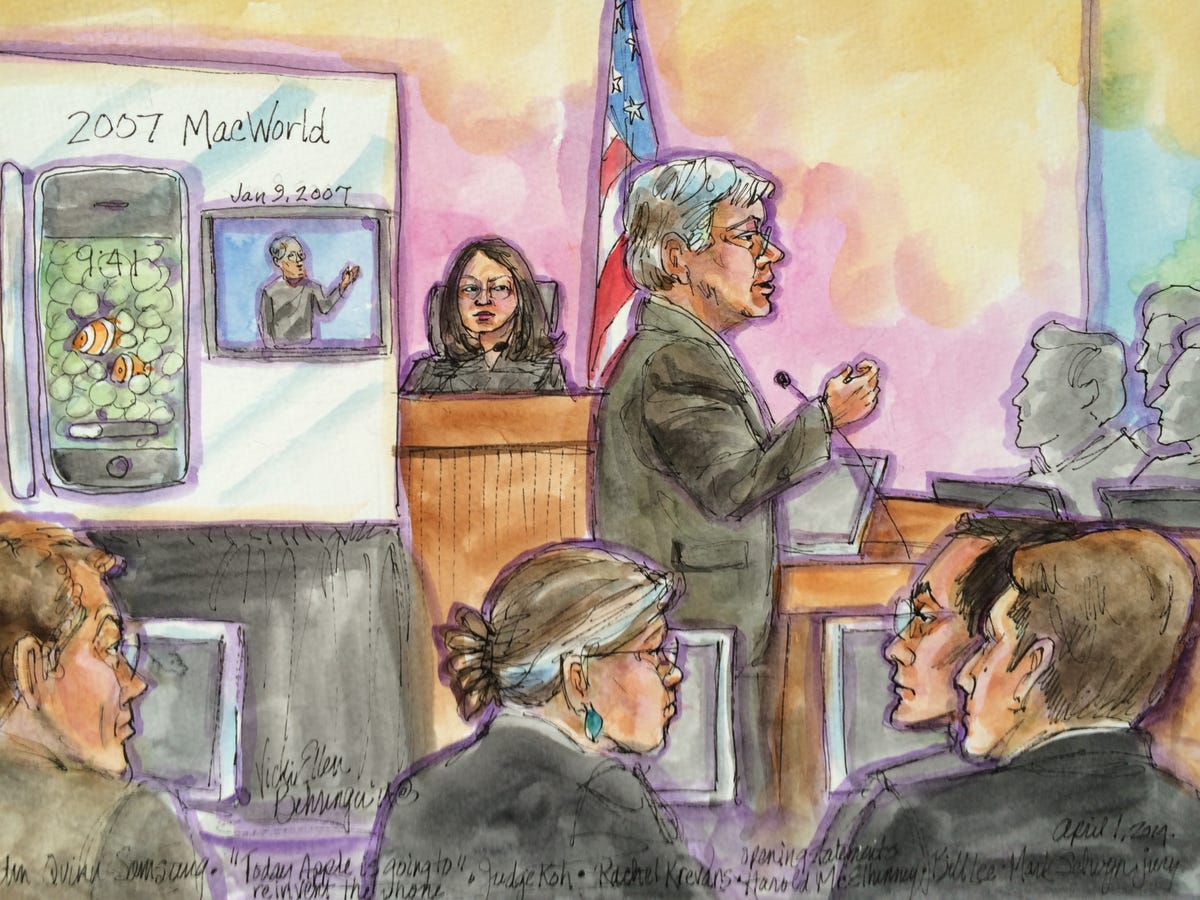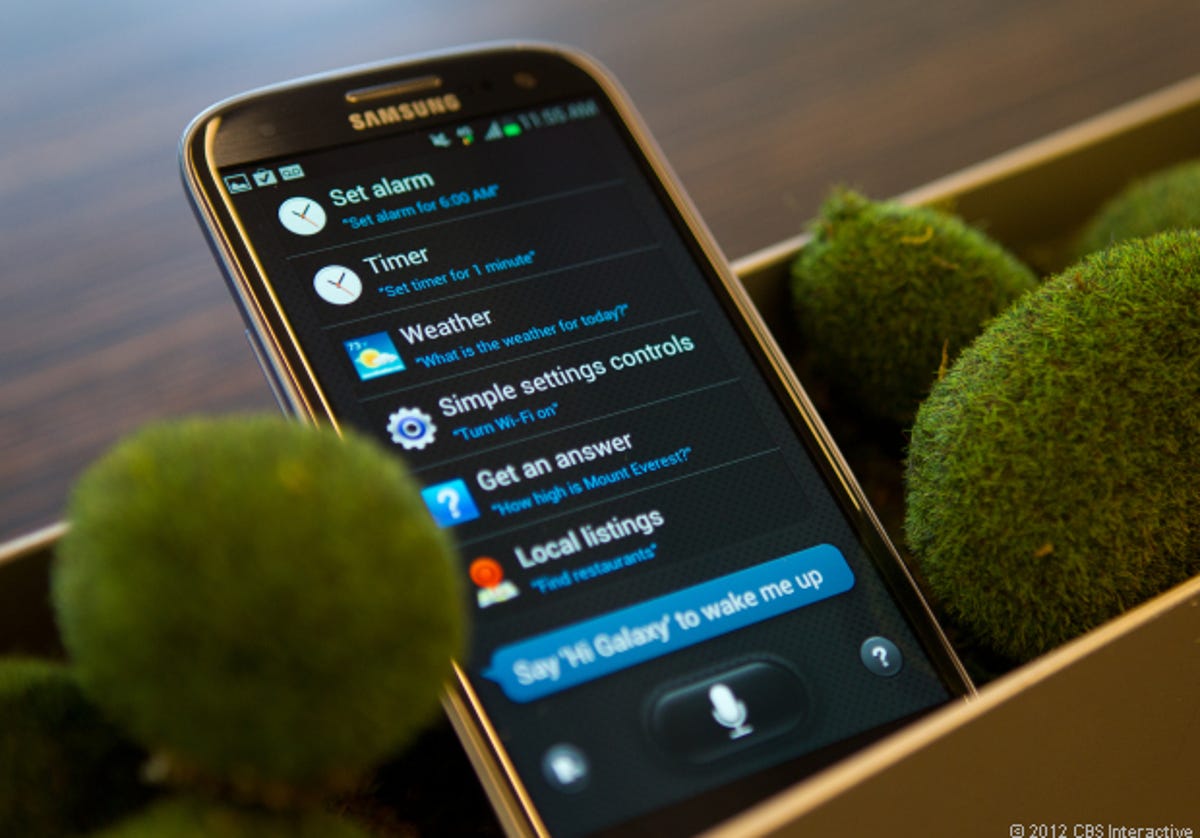
Vicki Behringer
SAN JOSE, Calif.–Samsung copied Apple’s iPhone as it tried to figure out how to react and compete with the device, Apple attorneys told a court here Tuesday. Because of that, Samsung should pay Apple about $2 billion in damages, they said.
Harold McElhinny, one of the lead attorneys in Apple’s patent infringement lawsuit against Samsung, said during opening arguments that Samsung realized it “simply did not have a product that could compete successfully against the iPhone.” He cited internal Samsung documents, including a memo containing comments from JK Shin, Samsung’s head of mobile, that said the company was suffering a “crisis of design” and had to figure out how to respond to Apple.
“The evidence in this case will be that Samsung copied the iPhone and it also took many other novel Apple inventions that have not yet appeared in Apple products,” McElhinny said. “Samsung specifically chose to copy the features at issue in this case.”
Almost two years after Apple and Samsung faced off in a messy patent dispute, the smartphone and tablet rivals have returned to the same San Jose, Calif., district courtroom to argue once again over patents before federal Judge Lucy Koh. Apple is arguing that Samsung infringed on five of its patents for the iPhone, its biggest moneymaker. Samsung, the world’s largest mobile phone maker, wants about $7 million from Apple for infringing two of its patents.
The companies will give more details about damages during their opening arguments Tuesday.
McElhinny said Samsung has sold more than 37 million infringing devices. If the two parties had negotiated royalties, Samsung would have paid an average of $33 per device or $40 per device — or about $2 billion overall — for the use of all five Apple software patents. That level has been deemed extremely high by experts such as Florian Mueller of the popular blog Foss Patents.
However, Apple argued that it would have had to negotiate with Samsung while it also was pursuing other cases and while it knew Samsung was copying its devices and hurting its profits. The company would have tried to get as much money as it could from Samsung in that scenario — one where it was forced to do something completely against its nature (settle with Samsung).
Related links
- Apple vs. Samsung: All the facts you need to know (FAQ)
- Jury awards Apple more than $1B, finds Samsung infringed
- Samsung owes Apple $290M more in damages, jury says
- Tech novices set to determine the fate of Apple v. Samsung
“Given the success of these features in the marketplace and given the importance of the iPhone to Apple’s success, Apple would not have agreed to license these patents to this company for less,” McElhinny said.
He admitted that the requested damage level is high, but said he hopes that at the end of the trial, the jury “will understand the reason the damages in the case are high is because the scope of Samsung’s infringement has been massive.”
McElhinny also said that an Apple expert will say that about 10 percent of people who bought Samsung devices would have purchased an iPhone if the Samsung device wasn’t available. He also noted that other Samsung internal documents showed the company believed that “software is the new value driver” and that features patented by Apple were fundamental to having a successful product. One, universal search, was turned off by Samsung after Apple sued Samsung, but the company turned it back on following complaints by users, McElhinny said.
Bill Lee, another Apple attorney, said that the two patents Samsung said Apple has infringed are patents the Korean company purchased after Apple sued it. Apple’s engineers didn’t know about the patents at the time they developed the iPhone, he said.
Apple’s attorneys had 90 minutes to present Apple’s case, then Samsung will have the same amount of time for its own opening. CNET will update this report as the arguments progress.


CNET
The latest installment of the Apple vs. Samsung saga kicked off Monday with jury selection as the tech giants battle over patent infringement. The companies selected 10 jurors — six women and four men — from a pool of about 140 potential candidates. While the jury pool comes from people living and working in Silicon Valley, few have tech backgrounds. One works as police officer, another is a retired teacher who likes salsa dancing, and yet another is an accounting assistant. In the more tech-savvy category falls a retired software executive from IBM and an executive who works in renewable energy.
However, two jurors asked to be excused from duty at the beginning of court Tuesday. One cited illness while the other cited financial hardship. That brought the jury size down to eight, four women and four men. The jury must have six people for the trial to progress. Judge Lucy Koh joked that she would be giving the remaining jurors vitamin C and energy drinks and warned them against going bungee jumping or taking other risks for the next month.
Apple and Samsung have accused each other of copying features used in their popular smartphones and tablets, and the jury will have to decide who actually infringed and how much money is due. This trial involves different patents and newer devices than the ones disputed at trial in August 2012 and in a damages retrial in November 2013.
For instance, the new trial involves the iPhone 5, released in September 2012, and Samsung’s Galaxy S3 , which also debuted in 2012.
The companies may be asking for damages and sales bans, but what’s really at stake is the market for mobile devices. Apple now gets two-thirds of it sales from the iPhone and iPad, South Korea-based Samsung is the world’s largest maker of smartphones, and both want to keep dominating the market. So far, Apple is ahead when it comes to litigation in the US. Samsung has been ordered to pay the company about $930 million in damages.
Apple v. Samsung 2014: The gadgets in question






There are seven patents at issue in the latest case — five held by Apple and two by Samsung. Apple has accused Samsung of infringing US patents Nos. 5,946,647; 6,847,959; 7,761,414; 8,046,721; and 8,074,172. All relate to software features, such as “quick links” for ‘647, universal search for ‘959, background syncing for ‘414, slide-to-unlock for ‘721, and automatic word correction for ‘172. Overall, Apple argues that the patents enable ease of use and make a user interface more engaging.
Samsung, meanwhile, has accused Apple of infringing US patents Nos. 6,226,449 and 5,579,239, or in shorthand, ‘449 and ‘239. The ‘449 patent, which Samsung purchased from Hitachi, involves camera and folder organization functionality. The ‘239 patent, which Samsung also acquired, covers video transmission functionality and could have implications for Apple’s use of FaceTime.
The Samsung gadgets that Apple says infringe are the Admire, Galaxy Nexus, Galaxy Note, Galaxy Note 2, Galaxy S II, Galaxy SII Epic 4G Touch, Galaxy SII Skyrocket, Galaxy S3, Galaxy Tab 2 10.1, and the Stratosphere. Samsung, meanwhile, says the iPhone 4, iPhone 4S, iPhone 5, iPad 2, iPad 3, iPad 4, iPad Mini, iPod Touch (fifth generation) and iPod Touch (fourth generation) all infringe.
The arguments by Apple and Samsung in the latest case are expected to last until April 29 or 30, and then the jury will deliberate. Court will be in session three days each week — Mondays, Tuesdays, and Fridays — though the jury will deliberate every business day until it has reached a verdict.
CNET will bring you full coverage as the trial progresses.
Corrected name of Apple lawyer Bill Lee at 5:05 p.m.



